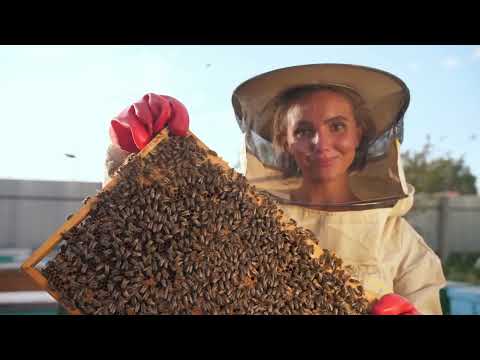
Protecting Our Pollinators
Pollinators are essential to healthy, biodiverse ecosystems.
National Pollinator Week is celebrated every June to raise awareness about what we can do to protect our important pollinators.
Bees and other pollinators, such as butterflies, beetles, flies and other insects play a vital role in producing more than 100 crops grown in the United States.
The USDA supports the critical role pollinators play in agriculture through research and data collections, diagnostic services and pollinator health monitoring, pollinator habitat enhancement programs, and pollinator health grants.

Latest News about Honey Bee Health
Nature Preserve Vintage Museum Collection, Modern Research Intersect in Century-Long Bee Study
Pearl Millet Wins Approval From Honey Bees and Other Pollinators
USDA, University Researchers Develop Near Chromosome-Level Genome for the Mojave Poppy Bee
The Right-Size Nest Can Maximize Pollination Capabilities of Solitary Bees
USDA Researchers Use an Edible Blue-Green Algae to Protect Honey Bees Against Viruses

How the Agricultural Research Service is Helping Pollinators
Breeding Honey Bees for Adaptation to Regionalized Plants and Artificial Diets
Honey bees could be intentionally bred to thrive on plants that are already locally present or even solely on artificial diets.
ARS Asian Giant Hornet Research
How ARS is protecting pollinators from a new threat — the Asian giant hornet.
Natural Products May Be Buzzworthy Solutions for Honey Bees' Health
Researchers from the ARS Bee Research Laboratory in Beltsville, Maryland, and collaborators found some natural products' medicinal properties reduced virus levels and improved gut health in honey bees.
Honey Bee Health
ARS is striving to enhance overall honey bee health and improve bee management practices by studying honey bee diseases as well as basic honey bee biology and genetics.
Trapping Weevils and Saving Monarchs
ARS studies intended to improve detection of boll weevils could help save the monarch butterfly.
Collecting a Library of Bee Genomes
ARS is leading a project dubbed "Beenome100" to produce high-quality maps of the genomes of at least 100 bee species, capturing the diversity of bees in the United States, representing each of the major bee taxonomic groups in this country.
Which Milkweeds Do Monarch Butterflies Prefer?
Not all milkweeds are created equal when it comes to species of the native flowering plants that monarch butterflies prefer most.
Pollinator Resources: Fact Sheets, Blogs and More

Pollinator Resources: Fact Sheets, Blogs and More
ARS Honey Bee Health page
Honey bees are a critical link in U.S. agricultural production. Learn about Colony Collapse Disorder and other major factors threatening honey bee health.
ARS Facebook Premiere on Beekeeping
Try your hand at beekeeping with these tips from our bee expert and help our pollinators.
Gardening for Native Bees in Utah and Beyond
Make sure your garden is bee friendly (USDA Bee Biology and Systematics Lab, Logan, UT)
Pollinator Friendly Tips
Tips from the USDA's Natural Resources Conservation Service to help you be a friend to pollinators.
The U.S. National Pollinating Insects Collection
As part of the ARS Pollinating Insects Research Unit, this world class collection supports research to enhance pollination through the development of native bees as crop pollinators.
Updated USDA Program Enables Farmers and Ranchers to Help Monarch Butterflies
USDA's Natural Resources Conservation Service has updated its Conservation Stewardship Program to enable farmers and ranchers to plant milkweed and other plants to help monarch butterflies.
U.S. Forest Service's Pollinator of the Month
Highlights the interdependency of certain species of native North American wildflowers and their pollinators. Most plants have a flower color, blooming period or scent that will attract a particular type of pollinator to its pollen.
USDA National Pollinator Week blogs
USDA blogs related to past National Pollinator Week.
USDA Pollinators Site
Each of us depends on pollinators in a practical way to provide us with the wide range of foods we eat. Learn about USDA initiatives
ARS Honey Bee Research Laboratories

Did you know? ARS bee research laboratories are located throughout the United States. Each of the labs focus on a wide range of issues that impact bee health. Learn more
ARS Bee Research Laboratories
Bee Research Laboratory
Beltsville, MD
Carl Hayden Bee Research Center
Tucson, AZ
Honey Bee Breeding, Genetics and Physiology Research Unit
Baton Rouge, LA
Pollinating Insect-Biology, Management, Systematics Research Unit
Logan, UT
Invasive Species and Pollinator Health Unit
Davis, CA
Southern Horticultural Research Center
Poplarville, MS
Tropical Crop and Commodity Protection Research Unit
Hilo, HI
Agricultural Genetic Resources Preservation Research Unit
Peoria, IL
Crop Bioprotection Research Unit
Peoria, IL
Insect Genetics and Biochemistry Research Unit
Fargo, ND
Soil Management Research Unit
Morris, MN
Vegetable Crops Research Unit
Madison, WI
Integrated Cropping Systems Research Unit
Brookings, SD
Can't get enough of pollinators? To learn more about honey bee and pollinator research, follow us on:










